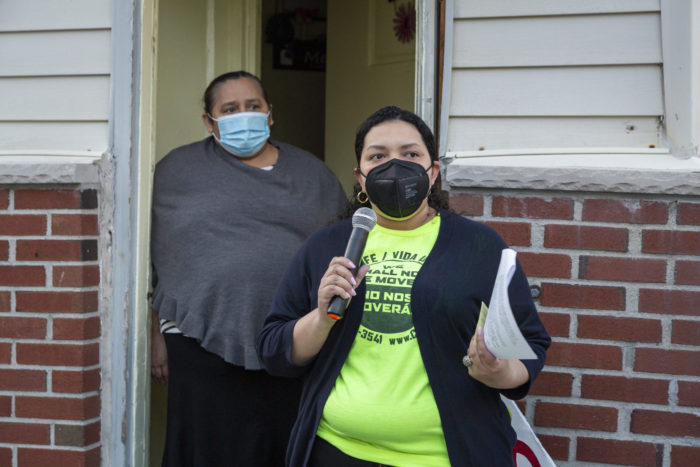
The plan, which was met with resident and community member pressure, had been to redevelop immigrant family homes
Following multiple rallies since June 2020 challenging the plan to build luxury condos, Boston’s Zoning Board of Appeals voted to reject a proposal that, if approved, would have eventually displaced working-class immigrant Central American families living at 168 Gove Street in East Boston.
Developer Fernando Dalfior’s plans had been on the agenda for a vote in the ZBA four times this year and were deferred three times on the voting day. The delays have not deterred residents and community members from continuously gathering solidarity and support from the housing justice organization City Life/Vida Urbana. Furthermore, over 790 Boston residents submitted comments of opposition to the ZBA digitally and physically urging them to deny the project and prevent displacement.
The ZBA finally rejected the vote on September 28 because of “miscommunication of all parties” due to last-minute changes to the project proposal that were not included on the final ZBA agenda. No one—neither tenants nor legislators—had known about the changes until the ZBA hearing presentation.
“After the fourth hearing, the push we had as a community is what made the landlord reflect that his project wasn’t going to pass,” said Amador, mother and tenant leader of 168 Gove tenant association. “Not because he wasn’t going to get the variances but because of the amount of opposition from the tenants, community, and politicians. When the ZBA rejected the vote, I felt like that ZBA finally did justice not just for me but for the community because there’s so much tension with city agencies about honoring community demands.”
No-fault eviction filings, which are typically driven by luxury development and gentrification, have increased in recent months across Massachusetts. “No-fault evictions are indefensible,” said Steve Meacham, Coordinator of Organizing with City Life/Vida Urbana. “As the delta variant surges, the Boston moratorium is not enough. We need statewide protections with the Housing Equity bill to keep people in their homes and safe from the virus and the negative effects of gentrification.”
Shira Laucharoen is a reporter based in Boston. She currently serves as the assistant director of the Boston Institute for Nonprofit Journalism. In the past she has written for Sampan newspaper, The Somerville Times, Scout Magazine, Boston Magazine, and WBUR.

